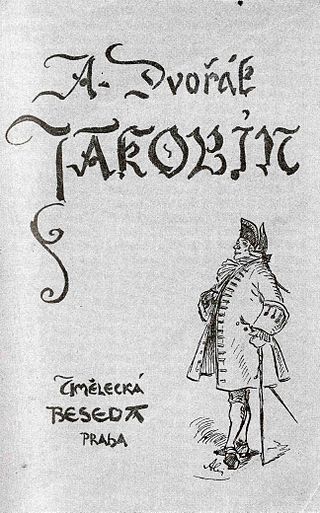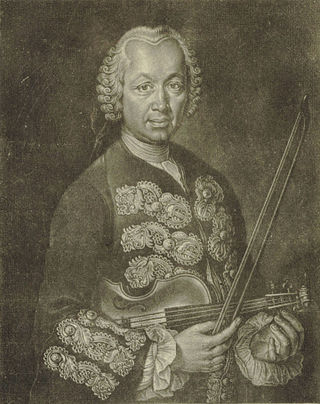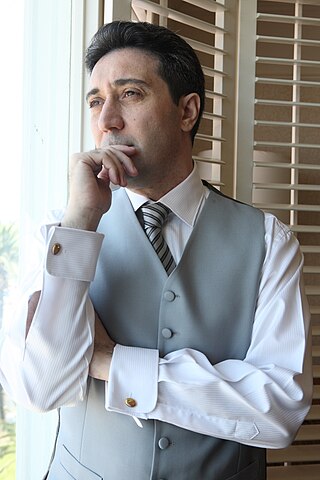Related Research Articles

Johann Christian Innocenz Bonaventura Cannabich, was a German violinist, composer, and Kapellmeister of the Classical era. A composer of some 200 works, he continued the legacy of Johann Stamitz and helped turn the Mannheim orchestra into what Charles Burney described as "the most complete and best disciplined in Europe.". The orchestra was particularly noted for the carefully graduated crescendos and diminuendos characteristic of the Mannheim school. Together with Stamitz and the other composers of the Mannheim court, he helped develop the orchestral texture that paved the way for the orchestral treatment of the First Viennese School.

Jakobín, or The Jacobin, is an operatic pastoral comedy in three acts by Antonín Dvořák, his Opus 84. Its Czech libretto by Marie Červinková-Riegrová employs characters from Alois Jirásek's story At the Ducal Court but in a plot of her devising. The opera's first performance took place on 9 February 1889 at the National Theatre in Prague with Adolf Čech conducting; it was however revised by both librettist and composer and premiered again, under Čech, on 19 June 1898, with notable adjustments to the last act, in the version that has since been standard.

Franz Benda was a Bohemian violinist and composer, who worked for much of his life at the court of Frederick the Great.

Gianluigi Gelmetti OMRI, was an Italian-Monégasque conductor and composer.

Georg Anton Benda was a composer, violinist and Kapellmeister of the classical period from the Kingdom of Bohemia.

Kenneth Daniel Fuchs is a Grammy Award-winning American composer. He currently serves as Professor of Music Composition at the University of Connecticut in Storrs, Connecticut.

Jiří Stivín is a Czech flute player and composer.

Ariadne auf Naxos is a duodrama in one act by Czech composer Georg Benda with a German libretto by Johann Christian Brandes. It was commissioned by Abel Seyler, whose theatrical company arrived in Gotha in 1774. The opera's first performance was at the Schloss Friedenstein, Gotha, on 27 January 1775.

Pygmalion is a monodrama in one act by composer Georg Benda with a German libretto by Friedrich Wilhelm Gotter. The opera's first performance was at the Ekhof Theatre, the court theatre in Gotha, on 20 September 1779. Pygmalion was the fourth of the five theatrical collaborations of Benda and Gotter. Gotter based his text on Jean-Jacques Rousseau's 1762 play Pygmalion. Benda's melodrama is unusual as it has no singing roles. Two of the three characters, Pygmalion and Galatea, are spoken roles; the other, Venus, is silently acted on stage.

Medea is a melodrama in one act with five scenes by Bohemian composer Georg Benda with a German libretto by Friedrich Wilhelm Gotter. The work was first performed in Leipzig at the Theater am Rannstädtertor on 1 May 1775.
The Cappella Istropolitana is a Slovak chamber orchestra based in Bratislava, Slovakia. Its name is derived from the Greek name for Bratislava, Istropolis.
David Porcelijn is a Dutch composer and conductor.

Lawrence Brownlee is an American operatic tenor particularly associated with the bel canto repertoire. Describing his voice, Speight Jenkins, general director of the Seattle Opera, said: "There are other singers that sing this repertory very well, but I don't think anyone else has quite as beautiful a sound and as rounded a tone," and praise his "incredible top notes", adding about his high F (F5) in "Credeasi, misera": "With him it's not a scream, it's a beautiful sound." Mezzo-soprano Joyce DiDonato adds: "He is always in service of the music. His natural instrument is just incredibly beautiful. The word 'honey' comes to mind. He also has technical prowess and agility."

Marzio Conti is an Italian conductor and flautist.

Salvatore Di Vittorio is an Italian composer and conductor. He is the music director and conductor of the Chamber Orchestra of New York. He has been recognized by Luigi Verdi as a "lyrical musical spirit, respectful of the ancient Italian tradition... an emerging leading interpreter of the music of Ottorino Respighi".
Álvaro Cassuto is a Portuguese composer and conductor.
The Symphony No. 4, H. 305, by Bohuslav Martinů was composed in New York City from April 1945, and completed at Martinů's summer home at Cape Cod in June 1945. The finale bears the inscription South Orleans, 14th June, 1945.
Dismas Hataš was a Bohemian composer and violinist of the early classical period.
Jiří Čart was a Bohemian composer, violinist and flautist of the late baroque period.
Michael Spyres is an American operatic baritenor. He is particularly associated with the bel canto repertoire, especially the works of Rossini, and heroic roles in French grand opera.
References
- ↑ ITCN.com. "Artists International Management - Christian Benda". Artistsinternational.com. Retrieved 8 January 2014.
- ↑ "Christian Benda". Hispania Clásica. Archived from the original on 17 May 2006.
- ↑ "Christian Benda- Bio, Albums, Pictures – Naxos Classical Music". Naxos.com. 2011-06-25. Retrieved 8 January 2014.
- ↑ "Conductor". Prague Sinfonia. Retrieved 8 January 2014.
- ↑ "LSM Newswire: Classical Musicians Daniel Barenboim, Barbara Hendricks and Christian Benda Join Kofi Annan 'Äôs Climate Justice Campaign". Scena.org. 2009-11-12. Retrieved 8 January 2014.